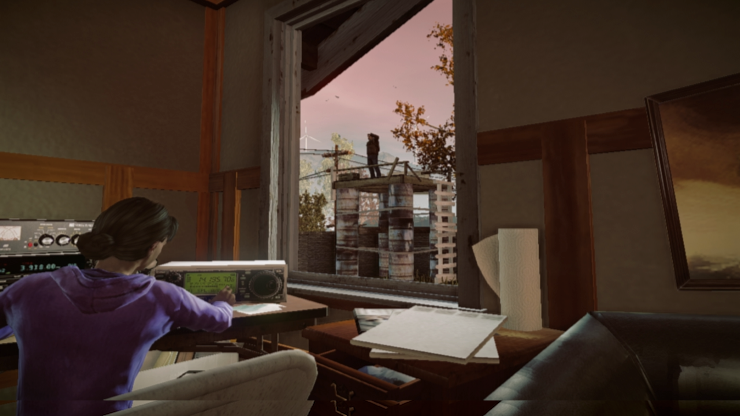Yesterday, I was reading this debate on Kotaku, sparked by comments made here by Shinji Mikami the creator of the Resident Evil games. As with any and all debates via Internet comments, you gotta take the good with the bad. But, I was surprised to find myself agreeing (at least in part) with some of the defenders of submissive female characters because while I would like to see a whole lot fewer submissive female characters, what I really want to see is a lot more well thought out characters that enhance the narrative, rather than detract from it or seem like somewhat of an afterthought.
In the Guardian interview, Mikami discusses character creation, specifically his thoughts on submissive female characters and he comments,
“If I had to name the woman character I most disliked in my games it would be Rebecca Chambers,” he says. “She’s submissive, she’s not independent. I didn’t want to include her but the staff wanted that kind of character in the game, for whatever reason. I’m sure it made sense to them. And in Japan, that character is pretty popular.” He shrugs despondently.
I can totally identify with that despondent shrug. We feminist gamers or Social Justice Warriors or whatever often get a lot of pushback for wanting more representation and more accurate representation because, apparently, “real” gamers want jiggle physics and non-threatening women in their games. (Someday maybe I will understand how strong women make some men feel somehow less “manly.”)
The comments on Kotaku start with,
“Something something Social Justice Warrior something something.
I say good on him for putting more thought into his characters, regardless of gender.”
And, while I don’t love the dismissal of SJW, I do agree that putting more thought into characters beyond the tropes would make for a richer game playing experience. (If, of course, you are into narrative, which I am.) Here at NYMG we have had many debates about what would make a good female character. Some of us want a totally badass female who takes no shit, while others are ok with a little vulnerability. Our debates over Lara Croft come to mind here. I really liked her in the latest Tomb Raider. To me, she felt real. She was dressed a bit more appropriately, and she was pretty badass. She was also at some points vulnerable. I’m thinking in particular of the scene when she was alone and scared and looking to connect with her teammates. Others felt this showed too much weakness in Lara, and I can see that point also. But, for me, if I were to think of putting myself in that situation, I would totally also be scared and looking for my team. But, I think some of the reaction to Lara’s vulnerability comes from the overall lack of really independent female characters. I may not be a badass, but I know plenty of independent females who are, and these women almost never get to play a relatable character.
Perhaps feminist gamers would be more open to a vulnerable female character (even, dare I say a submissive female character) every now and then. If it were every now and then, instead of every time. In the original Guardian interview, Mikami said, “I’m interested in vulnerable characters, in normal human beings. The horror experience is most scary when the player really isn’t sure whether their character is going to live or die – death and survival need to be on a constant see-saw.”
Mikami also directed The Evil Within, which I am playing now. As I wrote last week, I don’t see a lot of originality in that game at all, either in characters or story or even anything that happens. I listed a whole lot of games last week that The Evil Within reminded me of. A move toward more originality overall would be great. But, perhaps part of the reason I don’t find The Evil Within to be scary is because I literally do not care about any of the characters so far. So, while I agree with Mikami that “death and survival need to be on a constant see-saw,” I also need to care about the character.
I would love to see more varied characters overall. Independent women, submissive men (yes, that happens in real life), a mix of both, a variety of flaws. I would love to see all of that. The lack of this isn’t all that unique to games; we see this in other forms of entertainment also, hence the need for the Bechdel test. I would love to see a greater range of characters in general: characters that enhance the story, engage the player, and make it hard to walk away from the game before the story is over.





7 thoughts on “Vulnerability and the Female Character”
“I can totally identify with that despondent shrug. We feminist gamers or Social Justice Warriors or whatever often get a lot of pushback for wanting more representation and more accurate representation because, apparently, “real” gamers want jiggle physics and non-threatening women in their games. (Someday maybe I will understand how strong women make some men feel somehow less “manly.”)”
I’m what you may call, a ‘real gamer’ (I guess).
I’m not sure why you think people want non-threatening women, or why you think a videogame character can be threatening to me no matter the character. I love action girls personally and my observations are that guy don’t have any problem with female characters who wreck shop (Bayonetta, Joanna Dark, ANY fighting game chick(!), Samus, Trish, Jill Valentine (Mikami’s creation), Raiden (I kid, I kid)). Nobody in the history of gaming said, “I don’t wanna play as a girl.” Not when it’s a good game. Ever. We do not care.
Nor do we play games to be “manly”. There’s definitely a power rush; but I feel just as good landing a Canon Spike as I do a Shoryuken if you get my drift.
I feel like too many game developers think everything comes down to creating stronger female characters. That is only one side of the coin; the other side is creating weaker male characters.
A completely believable, three-dimensional woman can be ruined if a game surrounds her with stereotypical knights in shining armor. And it can ruin the game for male players just as much as it does for women.
I am a stereotypical big guy. I’m 6’5″ and built like linebacker. I notice when every male character looks like me, but is tougher, stronger, and more stoic than I could ever be. I play Dead Space, and it hits me that – were I dropped onto a space ship full of murderous, resurrected corpses – my reaction would not be to grab a power tool and save the day. I would be scared out of my mind, stumbling around trying to find a locker big enough to hide a six and a half foot, grown man.
I had the same issue with Dead Space- I love the game, but the character is supposed to be an systems engineer! I’m not saying that there aren’t systems engineers that are hard core crossfitters and totally built, but it did strike me as seeming slightly out of character for who he was supposed to be.
I suppose Luigi’s Mansion, where a key trait is that he’s a coward, is something you’re interested in seeing. That’s fine, but the objective-based quality of nearly all games demand avatars that get things done to a certain extent. Nobody wants a game where the character is too scared to do anything and just gets killed. Game over, roll credits.
HOWEVER; I am curious on how such a game featuring your hypothetical character would play. Because Lugi’s Mansion is damn good. You mentioned Dead Space (overrated HD porn but whatever), so I assume you’re coming from that genre, yes?
How would you design a game with incapable lead?
There’s a wide gulf between “vulnerable” (as Charlotte discusses) or even “not comically heroic/hyper-masculine” (which I think is what Matt is referring to) before you hit cowardly. In fact, Charlotte’s example of Tomb Raider is a pretty good one- a character the reflects some vulnerability in a way that makes narrative sense and create a more interesting and believable game world.
I could even see it working in the Dead Space series (not sure why you felt the need to put that dig in there, but whatever): Issac could easily start out as expressing more trepidation/fear/any-emotion-really and then over the arc of the game become more confidant/less unsure/possibly even desensitized to what’s going on around him. Would make total sense within that context.
The early Silent Hill games were pretty praised for doing precisely that.
This is more or less what I had in mind. I think a great recent example is Alien: Isolation. You start off doing exactly what a reasonable person would do: hiding for your life. But it does not end there: you gradually, carefully save the day.
My favorite part is that you never stop hiding in lockers and running away. Instead, you accomplish your goals while remaining a believable character. The game is not perfect, but it has (rightfully) received universal praise for its protagonist.
This touches on games’ relationship with women because Alien: Isolation has a female protagonist. I think it’s great its developers wanted to create a strong woman for its main character. However, I also think it says a lot that this sort of character is always a woman. Dead Space gets Isaac Clarke and Alien Isolation gets Ellen Ripley.
(I just dislike Dead Space for a great many technical and marketing reasons.)
I was actually thinking survival horror games after I made the post. And from that I thought about other characters that are vulnerable or unsure of their situation. And as I thought about it more, there’s actually much less characters of the hyper masculine trope than you think. Sure the box art paints this image, but even somebody like Master Chief’s vulnerability and hang-ups were explored as early as Halo 3 (and WAY explored in Halo 4). Snake in the MGS series also shows this throughout MGS4 (one could even say they made the concept of being triggered a game mechanic!).
YMMV for all of that, since there’s no way to gauge one’s satisfaction on the matter.